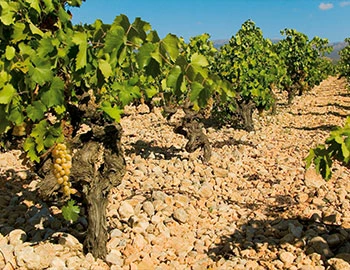
Descarte 2018
DO Toro, Bodega Elias Mora, 750 ml

| Grape variety: | Tinta de Toro |
| Producer: | Elias Mora |
| Origin: | Spain / Castilla y León / Toro |
| Other vintages: |
Description
Ripe, black cherry combined with the aromas of dates. Fragrant with nuances of roses, magnolia and mint. On the palate it is juicy, soft and elegant. The strong tannins are nicely integrated and give this elegant Tempranillo fullness and a velvety touch.
Attributes
| Origin: | Spain / Castilla y León / Toro |
| Grape variety: | Tinta de Toro |
| Ripening potential: | 3 to 9 years |
| Drinking temperature: | 16 to 18 °C |
| Food Pairing: | Spiced grillades, Beef Stroganoff, Hearty stew with pulses, Crispy roast chicken |
| Vinification: | fermentation at low temperatures |
| Harvest: | hand-picking |
| Maturation: | in partly new and used barriques/ Pièces |
| Maturation duration: | 12 months |
| Volume: | 15.0 % |
| Note: | Contains sulphites |
Elias Mora
The bodega was founded in 2000 by Victoria Benavides and the name of the winery honours the former owner of the vineyards: Elías Mora. The oenologist is one of Spain's undisputed winegrowers.
The Toro region is located west of the DO Rueda and the DO Ribera del Duero at about 800 meters above sea level, about 100 kilometres from the north-eastern border of Portugal. The main grape variety, Tinta de Toro, synonymous with Tempranillo, has been producing here unique wines for 2000 years. Their characteristics are clearly different from those of the wines from Ribera del Duero. The vines are traditionally grown "en vaso" in an extremely dry and harsh climate on stony, sandy soils, so that the leaves protect the fruit from the scorching sun. Less than 400 millimetres of rain fall per year, the summers are hot and the winters are extremely cold.
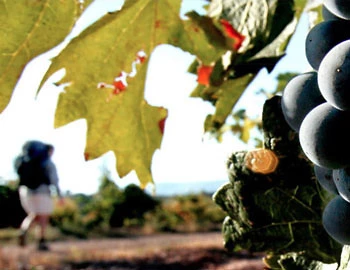
Tinta de Toro
Iberian Native
The Tempranillo is the emblem of Spain. With its juicy cherry fruit, crisp tannins, and its notes of leather and spices, it gives the Rioja its face. In the Ribera del Duero, it is known as Tinta del país. Here it turns out focused and muscular. As it has inhabited the Iberian Peninsula for centuries, it is known under countless synonyms. Across the border in Portugal, it is called Tinta Roriz, and lends colour and body to port wine. It also plays an important role in the booming wine scene of the Douro Valley. The Tempranillo owes its name to its early maturity – "temprano" in Spanish means "early". Tip: do it like they do in Spain and enjoy it with lamb.
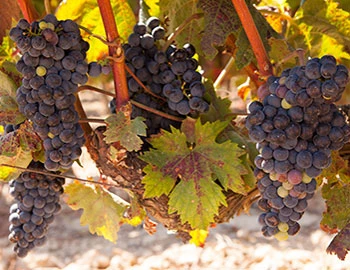
Tinta de Toro
Iberian Native
The Tempranillo is the emblem of Spain. With its juicy cherry fruit, crisp tannins, and its notes of leather and spices, it gives the Rioja its face. In the Ribera del Duero, it is known as Tinta del país. Here it turns out focused and muscular. As it has inhabited the Iberian Peninsula for centuries, it is known under countless synonyms. Across the border in Portugal, it is called Tinta Roriz, and lends colour and body to port wine. It also plays an important role in the booming wine scene of the Douro Valley. The Tempranillo owes its name to its early maturity – "temprano" in Spanish means "early". Tip: do it like they do in Spain and enjoy it with lamb.

Toro
Toro: Distinctive wines with great tradition
The town of Toro, with a population of 10,000, is perched on a rocky plateau high above the Douro River. Its gently rolling vineyards mostly grow the Tempranillo variety, which is called Tinta de Toro here. By the high middle ages, the wines from Toro were already sought after. The main assets of this comparatively small region of 6,000 hectares is the large stocks of old vines, which yield very strong, well-structured wines.
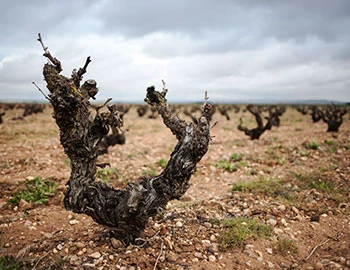
Castilla y León
Castile and León: Increasing diversity
Only 30 years ago, the autonomous region of Castile and León was an almost blank spot on the European wine list. This has changed immensely thanks to three grape varieties. The Tempranillo variety yields feisty, strong wines in Ribera del Duero and Toro. And Bierzo, the small wine area in the region's northwest, has experienced an impressive ascent, thanks to the character-laden Mencia variety. Finally, the fresh and fruity Verdelho pressings from Rueda have become the most successful Spanish white wines.
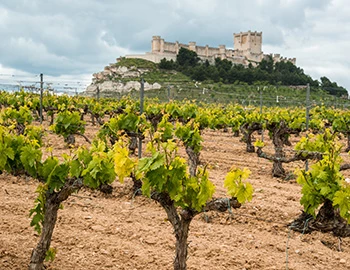
Spain
Spain – Variety and perfection
“Somewhere in la Mancha, in a place whose name I do not care to remember...,” begins Don Quixote's odyssey.
The most famous part is definitely when Don Quixote thinks windmills are his enemy and wants to fight them – until they nearly kill him. It’s possible there was a bit too much of the La Mancha wine at play. Spanish vines fight for their survival in rugged landscapes, battling fierce drought and rough soils. But they fight well.
